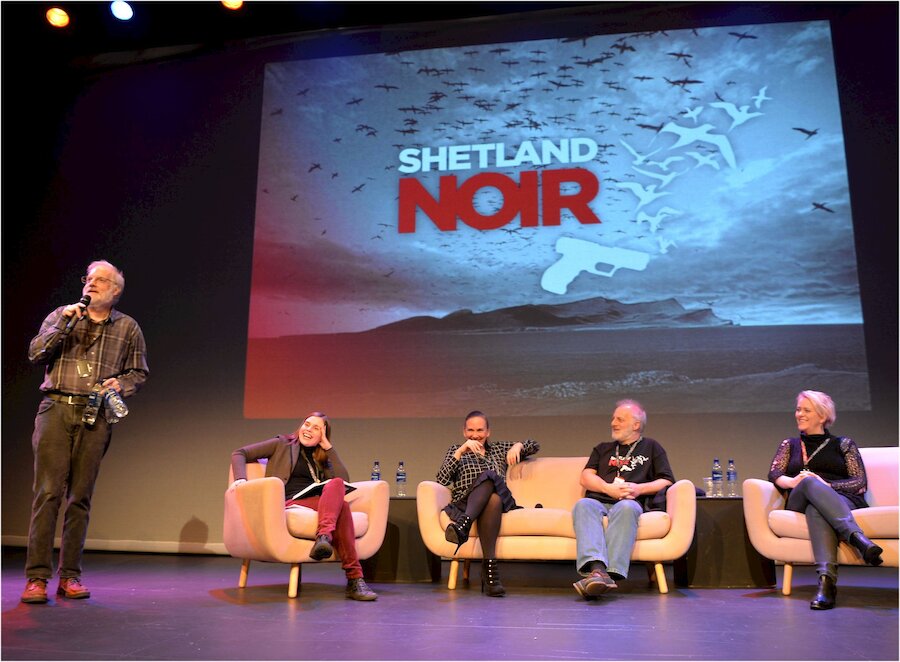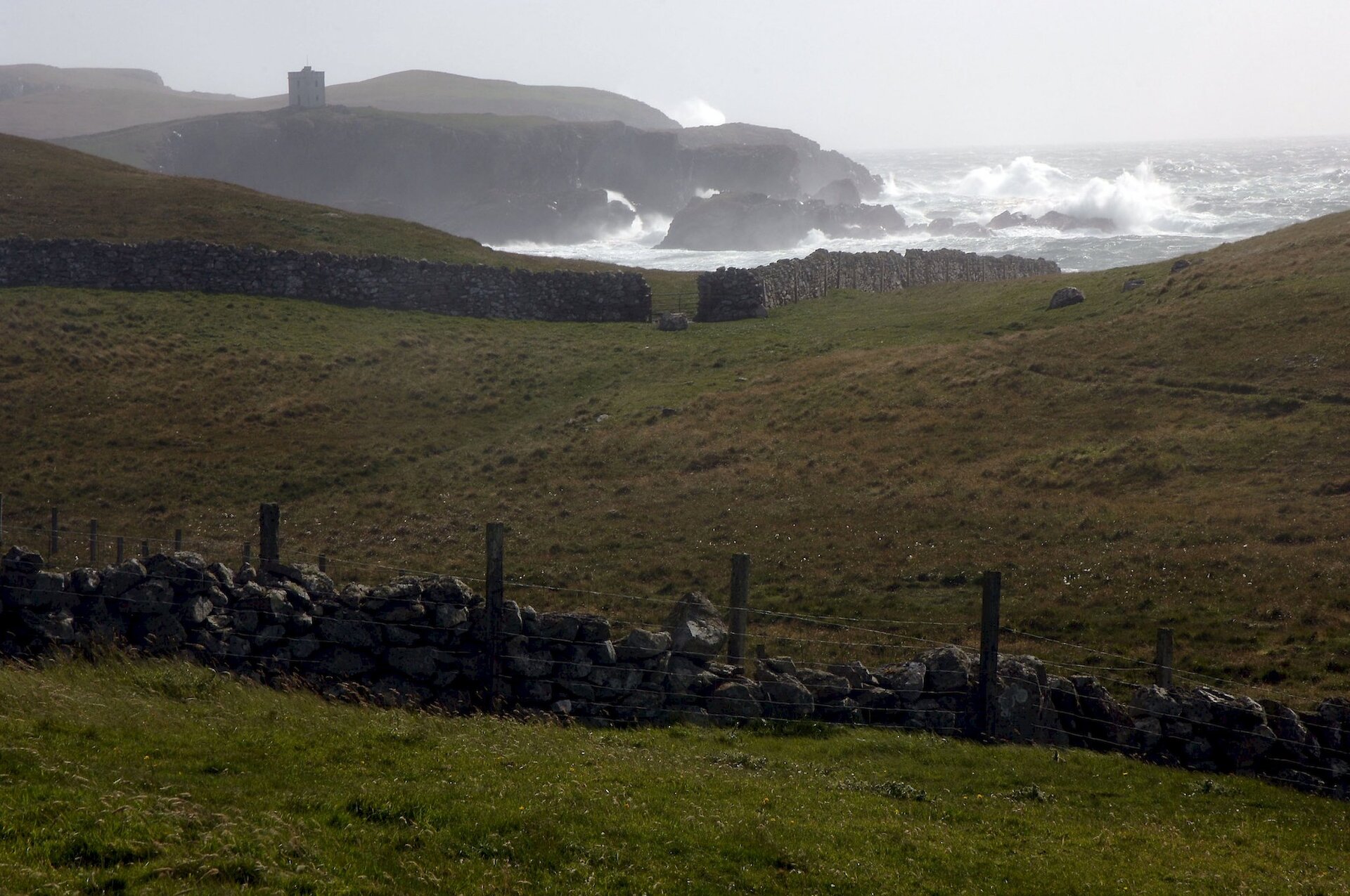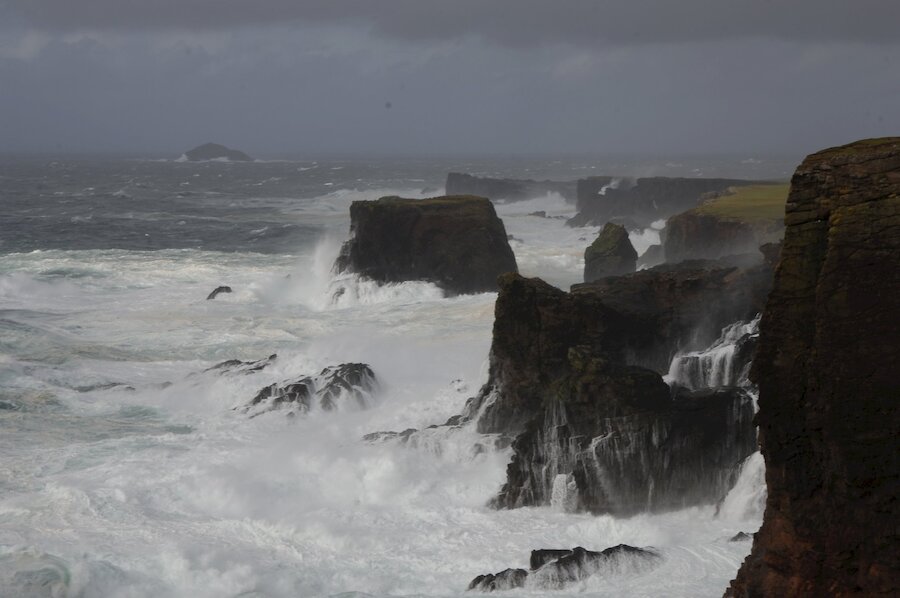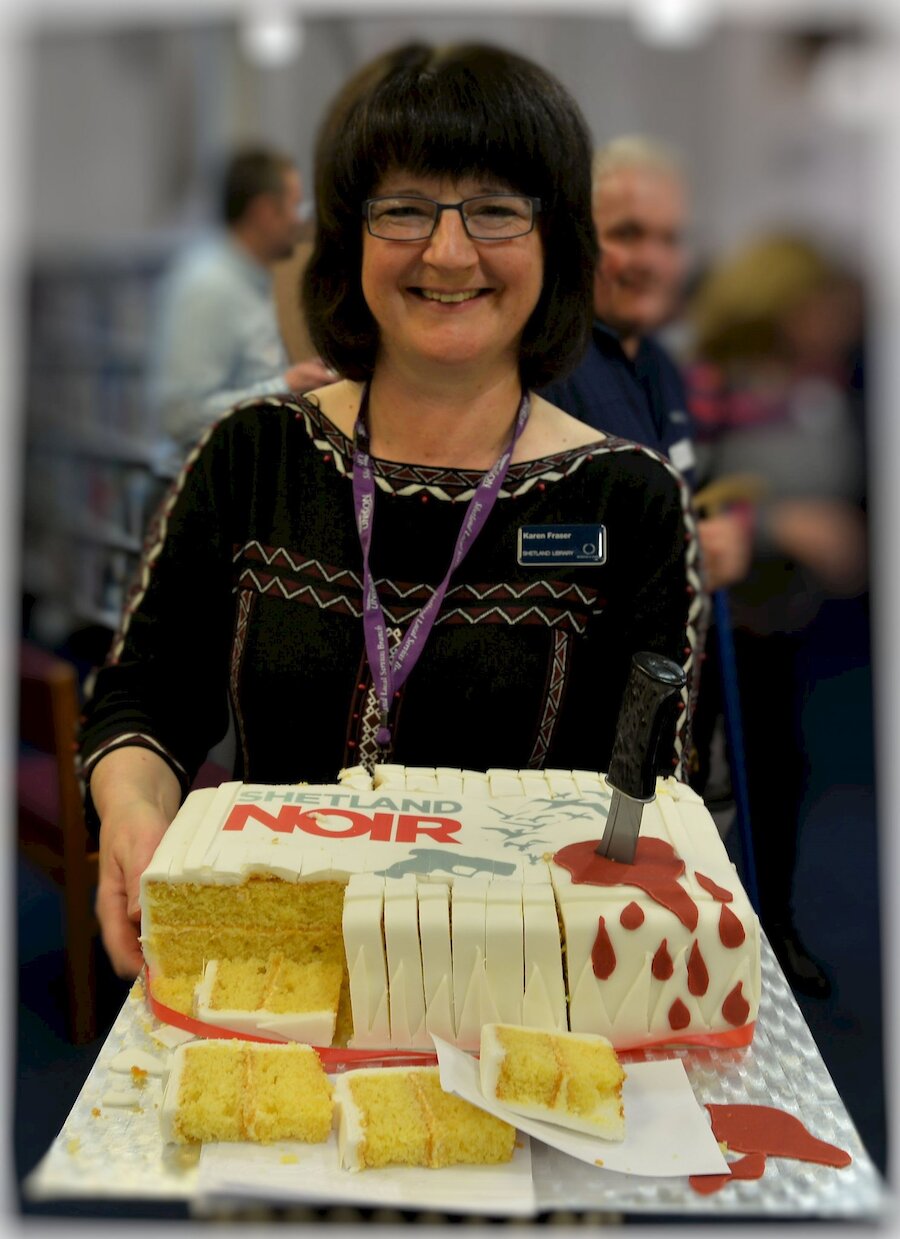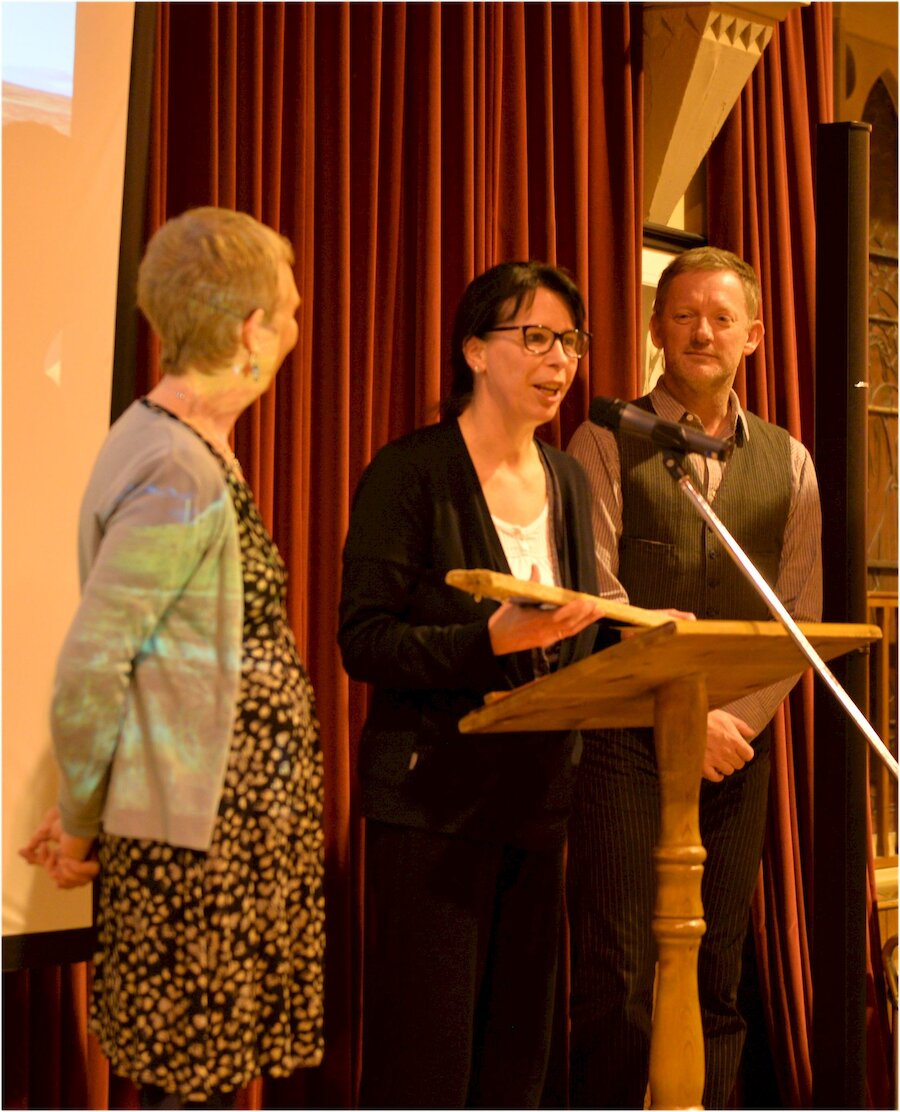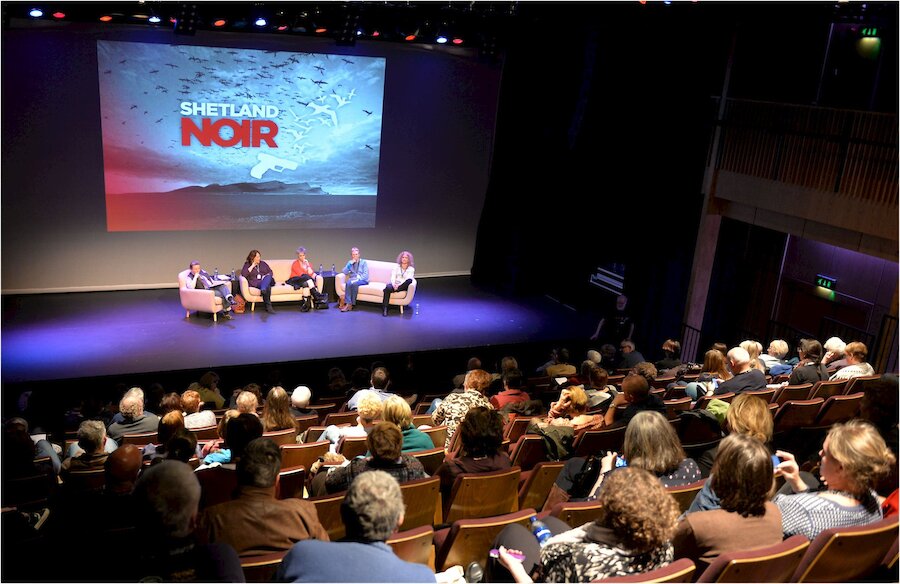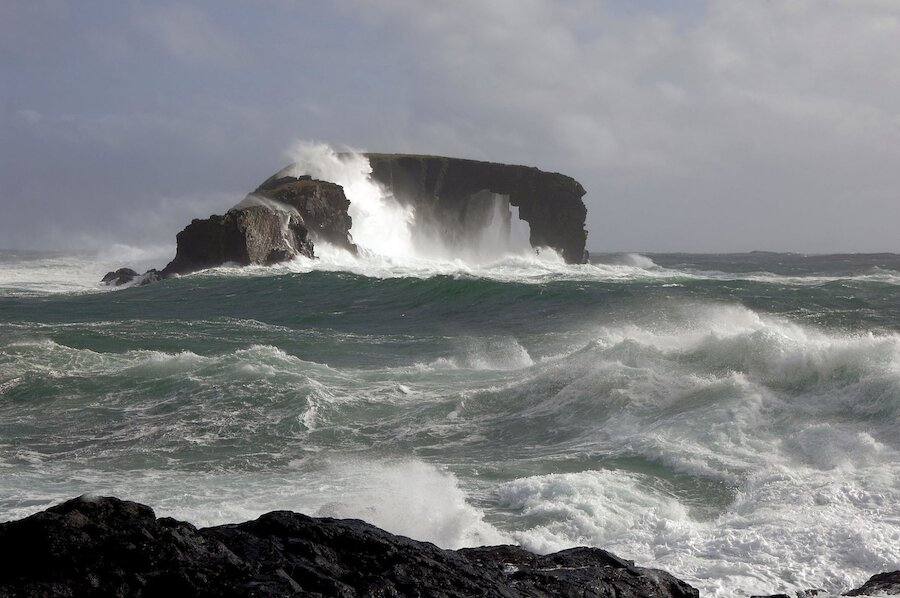With a low crime rate – not to mention a remarkably high detection rate – Shetland may seem as unlikely a setting for murder mysteries as Midsomer. However, that hasn’t prevented Ann Cleeves from creating a superb set of novels featuring Detective Inspector Jimmy Perez, the next of which will appear in autumn 2016.
...and we were chatting about the links between the north of the UK, Iceland and Scandinavia, and how there were some similarities. I think I said something like, ‘You should come to Shetland. Why don’t you let us have Iceland Noir in Shetland one year and then you can see for yourselves how similar the places are?’ And they said, ’Oh, OK then!
The idea went down well in Shetland, too, and the result was a gathering of many distinguished crime writers and their fans in November 2014. The opening of Shetland Noir coincided with the passage over Shetland of Abigail, Britain’s first named storm. As Ann pointed out, it was indeed a big gale, leading to flight and ferry cancellations and delays, but everybody made it eventually.
I think that the stories of flights in are getting exaggerated and the adventures are becoming more and more exciting. People will go away and dine out on it for months.
The gale did make for some unexpected twists in the festival plot, but all was serene at the opening reception in the Shetland Library, which welcomed visitors from all over the world. Local author, Marsali Taylor, offered a succinct history of the islands and broadcaster, Mary Blance, introduced them to the Shetland dialect. There was a spectacular and delicious cake, too, and participants were to discover that, throughout the weekend, the crime might be fictional but the cake was real and omnipresent.
Friday and Saturday were mainly devoted to panel discussions in which a wide range of topics was debated. However, there was also a book launch featuring Marsali Taylor’s Footsteps in the Dew and the West Mainland Writers’ Group’s Wastside Noir, plus head-to-head readings and some musical entertainment. On Friday evening, a further, larger reception in Lerwick’s beautiful Town Hall featured some excellent food by Marian Armitage and the presentation of the Jimmy Perez Trophy to its winner, Helen Grant, by Douglas Henshall, who plays Perez in the BBC adaptation.
The sessions began with explorations of how ideas for stories are formed, the relationship between characters and authors and the links and differences between Scottish and Nordic Noir. Within ‘Bloody Scotland’, as the programme had it, what were the contrasts between Glasgow and Edinburgh in the approach to crime fiction? Alex Gray sought to argue that Glasgow was a cultural stronghold and not a city of ‘sink estates’ as some portrayed it. Was Edinburgh’s crime perhaps more restrained?
That question prompted an interesting flash of topicality; James Oswald highlighted the recent, real-life consequences of deploying Glasgow’s police to Edinburgh under Scotland’s new unified force, where their rather more forthright approach to, say, stop and search, had underlined the differences in policy and culture. On the other hand, it was pointed out, that was fertile ground for writers, adding dramatic tension; and authors could now send detectives all over the country.
Over the weekend, there were many insights into the writer’s craft. It became clear that one of the perks of the job was the opportunity fictitiously to dispose of people who’d been irritating in real life; property developers had been among the candidates and Alex Gray revealed that one of her victims was someone whom she and other passengers on an Edinburgh-Amsterdam flight had found especially obnoxious.
Delegates also learned about forensic science from one of Scotland’s leading practitioners, Dr James Grieve. Another expert, Helen Pepper, told them about crime scene investigation. They both stressed the need to ensure that their testimony could stand up to the most searching cross-examination.
In Iceland, story-telling has been a central part of the culture from the time of the sagas. The giving of books – often, large bundles of them – is traditional, especially at Christmas. That said, crime fiction is a relatively new genre, but it’s flourishing, perhaps helped by the Icelandic environment. Those long winter nights are replete with psychological potential; indeed, people expect Icelandic novels to be set in the winter. For best-selling author Yrsa Sigurðardottir, the addition of supernatural elements was also, at one time, a part of her writing.
There are cultural challenges, though, and they are ones that Shetland crime writers would recognise. In what is a relatively small community, where everyone knows almost everyone else, crime detection can induce a feeling of claustrophobia. Because everyone is a friend of a friend, people often can’t believe that someone has committed a crime. That, it was said, “is how the bankers got away with it”; and indeed Icelandic banks are apparently only ever robbed from the inside.
When another panel explored the differences between the traditional approach, as represented by Agatha Christie, and alternatives, the traditional won favour. Ann Cleeves, for example, regards herself as a traditional writer (“I like the cheap thrill of the surprise ending!”). The other participants – Marsali Taylor, Valerie Laws and Sarah Ward – agreed.
However, there was one strand of tradition which had deservedly fallen from favour, namely misogyny. Gender emerged as a main topic in several discussions. Despite the fact that Agatha Christie is the best-selling crime writer, several panellists noted that women’s place in writing was less secure than men’s. One analysis suggested that male reviewers were much more likely to recommend men’s writing. What’s more, female authors and their publishers still tend to use initials – or even male pseudonyms – in what may be an attempt to disguise their gender, in the belief that that will somehow make the writing more acceptable.
Panellists also discussed the ways in which women are portrayed. Things have fortunately moved on a bit from their routine slapping by Raymond Chandler’s Philip Marlowe, but Alex Sokoloff pronounced herself ‘sick of the clichés and sick of women as victims’. She’s anxious not to glorify serial killers and is instead interested in understanding the motivation. “I’m writing about what makes me angry and what I want to change”, she added.
Sunday’s programme faced delegates with an appealing choice. There was a bus tour, ranging widely across Shetland, of locations familiar to Ann Cleeves’ Jimmy Perez. Alternatives included crime-writing workshops and a dark tale, told on location, of a murder. The weekend was rounded off by more readings, a showing of Orson Welles’ classic, A Touch of Evil, and a party. Ann Cleeves felt happy about how it had gone.
Everybody seems to be having a good time. It’s brought in people from all over the world. There are people from the US and Europe as well as from the rest of the UK. It must be a good thing for Shetland, because it’s bringing in people and money, and people will go back and say ‘you really need to go to Shetland’.
Although it’s very stormy, you’ll have a great experience. And so that’s broadening the tourist season too, which must be great for Shetland as well.
In fact, the storm was short-lived, as Shetland storms often are. Sunday morning dawned bright and calm, perfect for the bus tour and ideal weather for Shetland’s Archivist, Brian Smith, to evoke the murder in the Lerwick lanes.
In 2016, Iceland will reclaim its festival, and many who visited Shetland Noir will make their way to the Nordic House in Reykjavik in time for the launch on Thursday 17 November; booking is already open. Equally, there will be many in Shetland who will hope that, before too long, Iceland will be prepared to lend it to the islands once again.
Shetland Noir was Shetland’s first crime writing festival and it was a collaboration between Shetland Arts, Promote Shetland and Iceland Noir.


